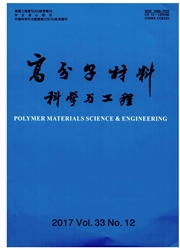

 中文摘要:
中文摘要:
研究了一种可用于固体润滑的烯丙基COPNA-BMI树脂的流变特性。在黏度实验和差热分析(DSC)实验基础上,并根据双阿仑尼乌斯方程,建立了与实验数据较为相符的化学流变模型,同时对树脂黏度进行了预测。结果表明,在120℃~160℃范围内,树脂的相对黏度特性符合双阿仑尼乌斯黏度方程,所建立的模型较好地表征了树脂的流变特性;树脂在温度小于120℃时固化反应迟缓,初始黏度较高;随着温度的进一步提高,树脂初始黏度降低,黏度随时间增长加快,在170℃左右黏度急剧上升;树脂比较理想的成型温度应选择在150℃左右。
 英文摘要:
英文摘要:
Rheological behavior of the copolymer resin of allyl condensed polynuclear aromatic (COPNA) resin and bismaleimide (BMI) for solid lubricant composite was studied with differential scanning calorimetry (DSC) analysis and viscosity experiments. A rheological model based on Dual-Arrhenius equation was established and used to simulate and forecast the rheological behavior of the resin. The results indicate that the established rheological model for relative viscosity is in good agreement with Dual-Arrhenius equation in the temperature range of 120 ℃~160 ℃. The initialized viscosity of the resin decreases with increasing temperature,and the relative viscosity increases with increasing time at certain temperature. The ideal processing temperature of the resin is about 150 ℃ in terms of the rheological model.
 同期刊论文项目
同期刊论文项目
 同项目期刊论文
同项目期刊论文
 Fabrication of nitrogen-containing hollow carbon nanospheres by pyrolysis of self-assembled poly(ani
Fabrication of nitrogen-containing hollow carbon nanospheres by pyrolysis of self-assembled poly(ani Carbonization behavior of coal-tar pitch modified with lignin/silica hybrid and optical texture of r
Carbonization behavior of coal-tar pitch modified with lignin/silica hybrid and optical texture of r Effect of rosin to coal-tar pitch on carbonization behavior and optical texture of resultant semi-co
Effect of rosin to coal-tar pitch on carbonization behavior and optical texture of resultant semi-co Preparation and properties of nitrogen-containing hollow carbon nanospheres by pyrolysis of polyanil
Preparation and properties of nitrogen-containing hollow carbon nanospheres by pyrolysis of polyanil 期刊信息
期刊信息
